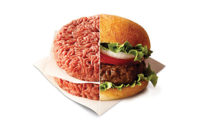New ‘Cardinal’ rule
Cardinal Meat Specialists adopts new slogan of “You CAN with Cardinal,” as it adds to its already impressive portfolio.




Despite its standing as one of Canada’s top meat processors and one of the most technologically savvy processors in North America, Cardinal Meat Specialists has never rested on its laurels. If anything, the Brampton, Ontario-based processor has pushed even harder, adding on new capabilities and investing in — or developing — new technologies. As a result, the company feels it is perfectly placed to capitalize on the latest industry trends.
“With economies being what they are, people are looking for cost-effective products, but they’re not willing to trade down to a TV dinner,” says Cardinal president Brent Cator. “We’ve seen restaurants and retailers looking for more custom products. They’re looking for fresh, and they’re looking for products that don’t have additives or preservatives — and the products have to taste great.
“What we have been able to do, by combining a lot of European and North American technologies,” Cator adds, “is come up with products that have a 100-plus day shelf life without having additives or preservatives — minimally processed products produced in a very cost-effective manner.”
In an effort to sum up its capabilities in a simple phrase, the company has adopted the slogan “You can with Cardinal.” Cator explains that customers may not be able to find or develop what they need, whether it is a retail item or a foodservice item that can be prepared consistently over a number of locations. Thanks to the company’s new advanced protein portioning (APP) technology, Cardinal is able to produce a number of products that can be processed at a high volume while still being customized to the individual customer’s needs.
Technological innovation is nothing new to Cardinal Meats. Its Natural Texture Forming process with burger patties led to the introduction of the Revolution Burger in the United States. That burger won new-product awards from both The National Provisioner and Sysco. The company is also known for its kettle-cooked products. Those two arenas have been combined with the APP technology, resulting in a high-speed, sealed-environment, fully cooked line, capable of producing anything from sausages and pulled pork to whole-muscle items.
The company’s drive toward new and improved technology has led to a new line of stuffed burgers. To date, the burgers in the marketplace that were considered “stuffed” were inclusion products, where items like cheese or bacon were mixed into the ground beef instead of having a true center-stuffed burger. The challenge of a truly center-stuffed burger is that the ingredient in the center of the patty may get super-heated during preparation. That heat is not a concern for a product like a chicken kiev that’s meant to be cut into with a knife, but a hamburger with a heated center has been a safety risk until now.
“If you have some melted cheese or sauce, then you’ve got this hot pocket in the center, and you’re going to burn people with that burger,” Cator explains. “Because of the technologies that we’re employing, we can actually create that product without that risk. That’s a huge innovation.”
Cardinal patented new technologies and built them in-house for the new stuffed burger capabilities. Its stuffed capabilities line is now limited only by its customers’ imaginations. Jalapeno and cheddar burgers, ham & Swiss chicken burgers and even surf & turf burgers with stuffed crab meat are all possibilities.
Cardinal completed the expansion of itsBrampton facility in 2013 to accommodate the new APP technology, and it has worked to prove out the new products internally. Sausages produced through the combination of coextrusion and sealed-environment processes offer longer shelf lives and cost-efficient products. Fully cooked chicken breasts that are grill-marked and portioned offer cost efficiencies in both production and input of raw materials.
“Instead of using a whole breast, there are ways to portion it into pieces,” Cator explains. “We’ve done that across beef, pork and poultry so far.”
|
Get more of the story online... This story is our most recent update on Cardinal Meat Specialists, which we’ve covered extensively over the past two years across our brands. To read Independent Processor’s cover feature from December 2012, visit bit.ly/IPCardinal1212. To read our 2012 New Product of the Year story on the Revolution Burger, visit bit.ly/12ProductofYear. |
The first APP products to reach the marketplace will be fully cooked burgers for the foodservice sector.
“We’re able to bring the advancements in fully cooked into the market at the same cost or better than you can buy a raw burger,” he says. “You’re not sacrificing the quality in the burger, and we’re locking in the food safety.”
Customers are already interested in APP products in both cost and waste reduction. A restaurant may prepare 20 rotisserie chickens for dinner service, but it may only use 10. Cardinal can offer a fully cooked chicken that requires minutes to prepare, meaning less food is thrown out at the end of the day. Additionally, products like braised beef that were once bought in bulk for cost savings can now be ordered in portion-controlled quantities without an exorbitant price point.
Along with all the new products, Cardinal has also beefed up its corporate infrastructure. Cator says that his primary company responsibilities lie in innovation and new capabilities to meet customer needs. He brought in Tony Tavares as chief operating officer to add depth to the senior management team. Tavares has a substantial background in meat processing, with experience at Canadian processors Maple Leaf Foods and Maple Lodge Farms.
“Between his skills and some of what we’ve built up internally over the last year, we’re really set to come to market, and I feel really good about that,” Cator notes. “We have more team members, we have a greater sales breadth, and we have a lot of people charged up to help customers drive their profits.”
Looking for a reprint of this article?
From high-res PDFs to custom plaques, order your copy today!








